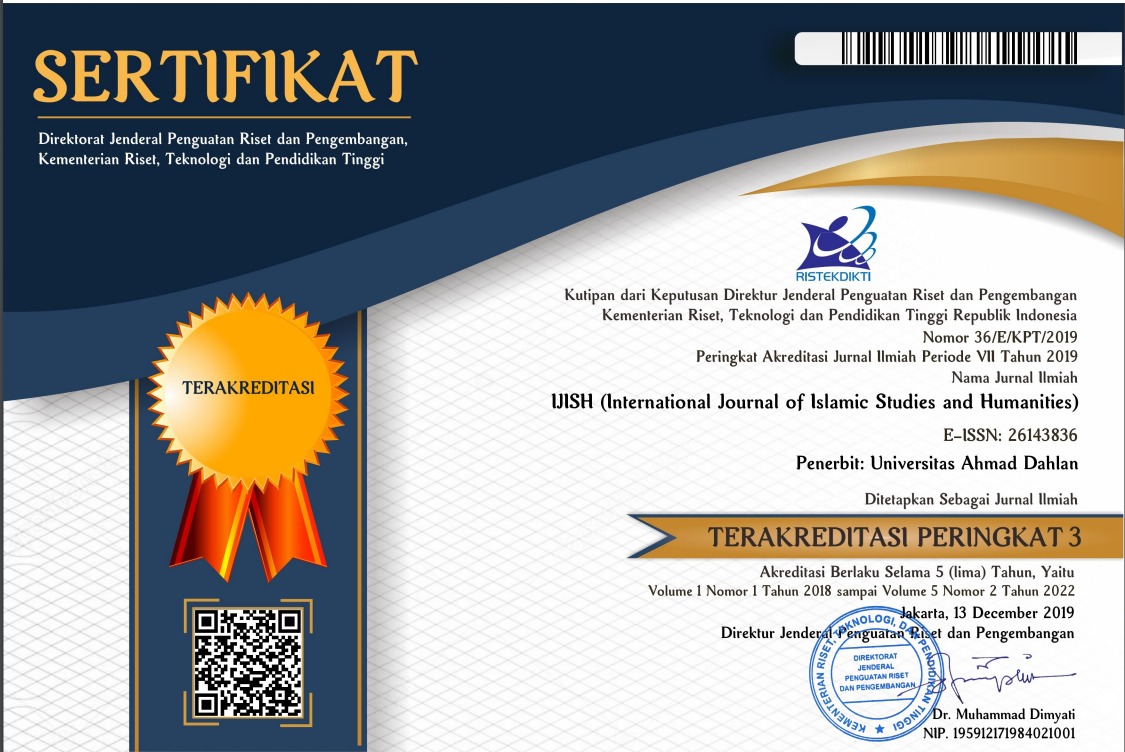Tazkiyatun Nafs as A Strength Base of Teacher Personality Competency
DOI:
https://doi.org/10.26555/ijish.v1i2.559Keywords:
Tazkiyatun nafs, Personality, Teacher competence, Islamic educationAbstract
The teacher should have a steady, stable, adult, wise, and authoritative personality competence, be an example for learners, and have a noble character, but in reality, his personality competence is still low and still far from the personality that teachers should have. The authors offer an alternative solution with the Islamic psychology approach that is Tazkiyatun nafs that can be used as a basis of teacher personality strengthening. This research uses qualitative descriptive approach and literature or library research. The essence of tazkiyatun nafs tends to talk about the soul (an-nafs). It is a process of purification of the human soul from the impurities, both visible dirt and inner dirt. Therefore, the notion of tazkiyatun nafs is closely related to morals and psychology, and in Islam, it serves as a pattern of human formation of good character and cautious to Allah. In this study, the authors found some of the following findings. First, the growth of one's personality is influenced by factors from within that is the integration of elements of aql (mind), qalb (heart), lust and outside factors such as the process of interaction with the environment. Second, the soul is very functional to one's personality. A clean soul will produce good behavior while a dirty soul will result in a low or weak personality.Downloads
Published
2018-10-16
How to Cite
Ghofar, A., Abubakar, U., & Azhar, M. (2018). Tazkiyatun Nafs as A Strength Base of Teacher Personality Competency. IJISH (International Journal of Islamic Studies and Humanities), 1(2), 128–140. https://doi.org/10.26555/ijish.v1i2.559
Issue
Section
Articles
License
Authors who publish with IJISH (International Journal of Islamic Studies and Humanities) agree to the following terms:
- Authors retain copyright and grant the journal right of first publication with the work simultaneously licensed under a Creative Commons Attribution License (CC BY-SA 4.0) that allows others to share the work with an acknowledgment of the work's authorship and initial publication in this journal.Â
- Authors are able to enter into separate, additional contractual arrangements for the non-exclusive distribution of the journal's published version of the work (e.g., post it to an institutional repository or publish it in a book), with an acknowledgment of its initial publication in this journal.
- Authors are permitted and encouraged to post their work online (e.g., in institutional repositories or on their website) prior to and during the submission process, as it can lead to productive exchanges, as well as earlier and greater citation of published work.

This work is licensed under a Creative Commons Attribution-ShareAlike 4.0 International License.






